There is a waterfall and a place where a hot river meets a cold one, some kilometers around Ipetu, but I am sticking to the roads instead of exploring and following random people. Just for Nigeria, crossing the country alive has the priority over the adventure.
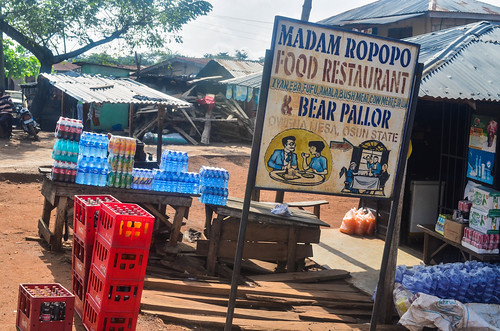
However, staying on the main roads may be the most dangerous place to be here. Just like yesterday, I can’t count the number of times where I am facing a car speeding right in front of me, coming from the other direction, overtaking another one going not that slow.
I spend most of my time on the roadside again with the pebbles and the branches, for a very unpleasant day.

My highlight is when I see again those huge snails. I have seen their shells in Ivory Coast, and here they are again. Unfortunately they are only raw and not grilled. It is 1 € for a big piece. Instead of eating them I end up taking pictures with the people around and drinking palm wine.
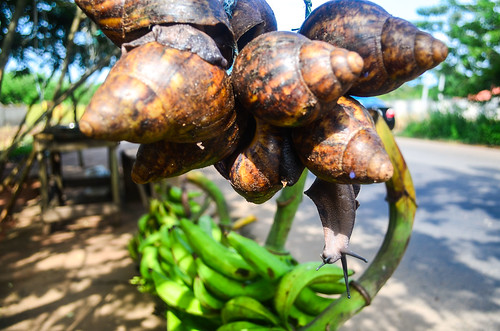
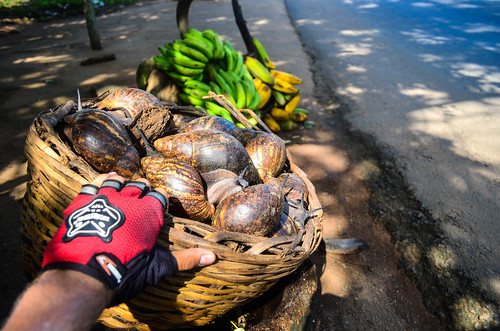
I cross another large town, Akure, and continue until Owo, early enough to visit the bank by daytime. In this land of money, the maximum amount that can be withdrawn at the ATM is 20’000 naira, not even 100 €. It must be a pain for the businessmen who drink champagne bottles for breakfast.
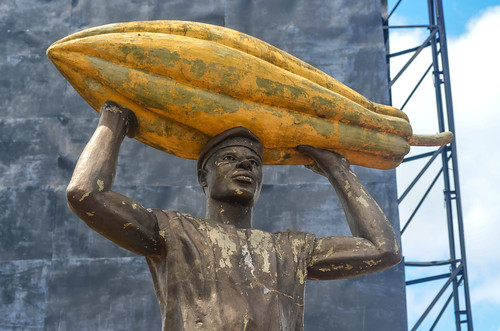
At the post office, just when the employee is about to glue the first stamp on my postcard, he stops abruptly and looks at me: “Money first!“. Like if I was buying stamps without the money. But here, money must always be given first. There is no way to enter a hotel room without showing the cash first. I never managed to bargain either, either it is really hard, either people like money too much. I only managed to restore the real price when I was overcharged in the first place. There is no nice gestures in the business.
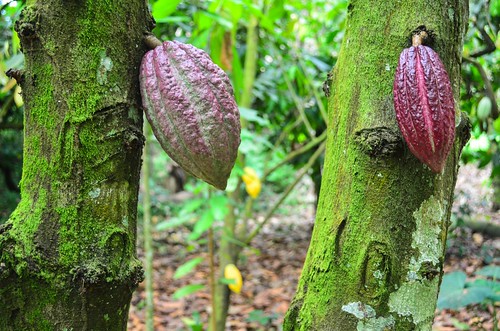
The hotel at the exit of Owo is rather cheap at 3000 naira (still the double of what it would be elsewhere in West Africa), which means it comes with no A/C And no generator: power comes when it wants, when NEPA is on a generous mood. The bar next door plays music when they have electricity too. I hear the most popular song of the continent, Chop my money, in its home country.
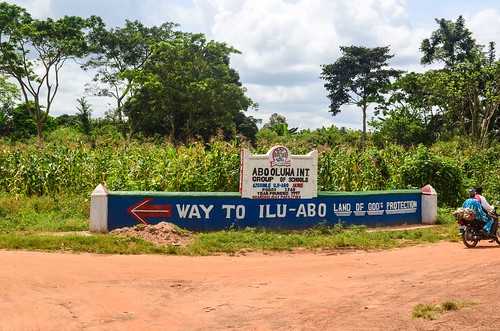
I have little daylight left for chain tensioning, cleaning, and a visual inspection of the bike to make sure I won’t have bad surprises on the road. The people who see me greet me with “well done“. I knew the term in Yoruba, it was my first one learnt, but I forgot. People say “well done” to others the same way a Japanese would say おつかれ!, to someone sweating or doing a job.
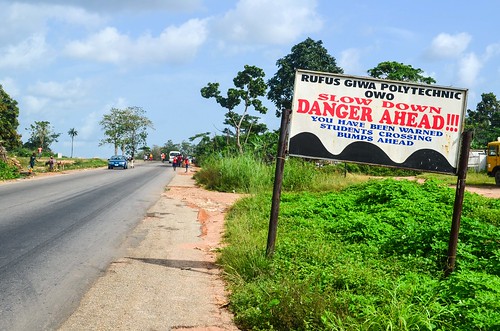
Owo has also some palace, it was home to another kingdom in the past. Present-day Nigeria seem to have a lot of pre-colonial history, but I am not focusing on it. Many passersby ask for my phone number. It disappoints them when I say I am only using it in Nigeria. There is not so much begging, which seems directly correlated to the presence of tourists (and after 5 days, I have yet to see the first other white face!) but some still try. The pupils all dressed in their uniforms are coming back from school, I see tons of them even on the highways.
Saturday morning is absolutely quiet: it is environment day, like every last Saturday morning of the month. Apparently, you can’t be caught outside doing business between 8 and 11 because everyone is supposed to be cleaning something. But it doesn’t apply for me, and it is perfect: the highway is empty, there are almost no cars on the road!
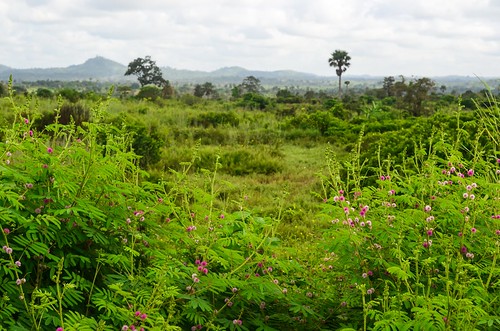
That surprising event makes me change my plans: I wanted to leave Owo from small roads instead of the far too unpleasant highways. But when I saw that my small road was in fact a bad gravel track destroyed by the rain, and the highway was empty, I ran onto the asphalt.
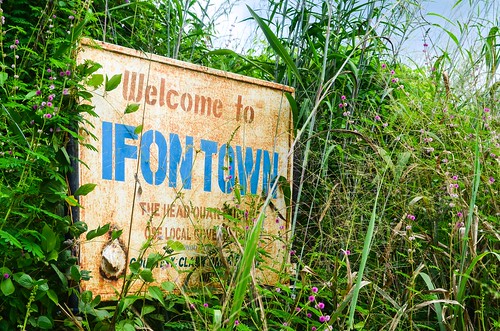
I have then two hours of fast and safe ride on the nice road to Benin City. There is only one military checkpoint, made of empty oil barrels on the road, and a small hut circled by “DO NOT GIVE BRIBE” signs. The army man there throws me a “Hey bicycle, you dash me something?“. Without stopping, I reply “No I’m white, I give no bribe“, he laughs and we say bye-bye.
After Ifon, I leave the main road for real: the highway would take me further to Benin City and a bridge over the Niger river in Onitsha, and it sounds very congested as it is the main crossing point of the river for the entire south of the country. Instead, I pick a small road going east but slightly north of Onitsha. I make a bet that there will be a boat service between two reasonably large cities facing each other across the Niger.
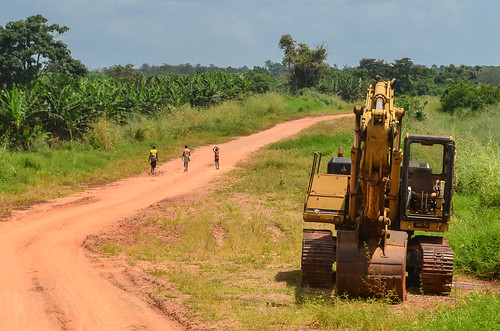
It is much more pleasant there, in the back country of the Edo state. Here, we don’t speak Yoruba, but it is not Igbo yet. We don’t say “odeabo” anymore for goodbye, but “issakiye“. A teenage girl says her village has never had electricity. Yet, the electric poles and wires fly over the houses, letting me imagine Africa as a place with more reliable infrastructure the more you go back in time.
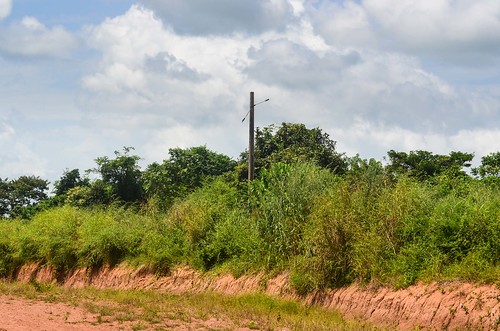
She tells me my coke is free. The same thing happens at my next Coca-Cola stop: “because of your handsomeness I will give you another coke“, says the old man keeping the shop. It is maybe the first time someone finds my beard handsome, and so rare to be offered something by someone by a shopkeeper. But for sure it makes me feel much more relaxed in the Edo state than in the western ones.

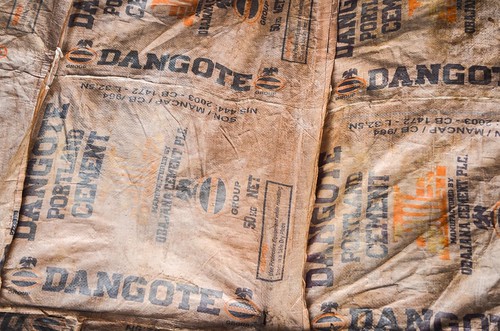
It is hard not to see those Dangote bags. Cement, flour or sugar, products of the Dangote group are everywhere. The company employing 22’000+ people is the largest conglomerate in West Africa, and was founded as recently as 1981 by the currently richest African, Aliko Dangote.
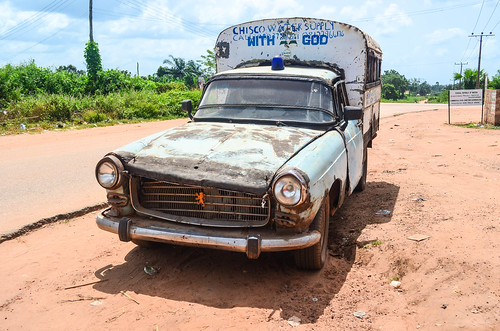
Unpleasant things can still happen, like those two random weird guys on a motorbike following me and insisting on asking precisely where I am heading to. But overall, I am starting to find Nigeria and Nigerians quite pleasant.
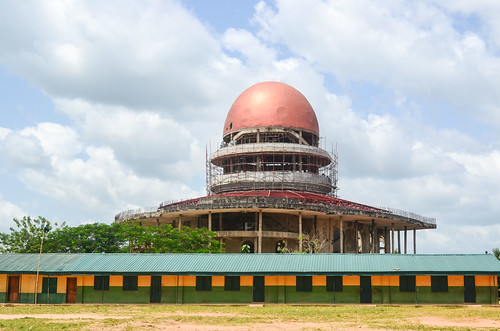
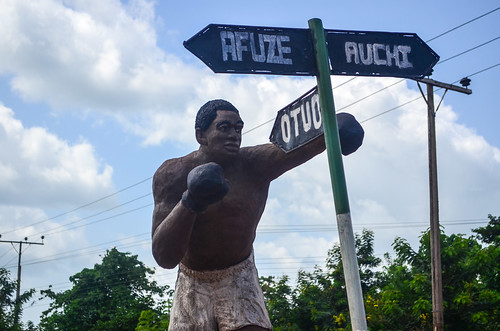
I stop in Auchi on a good timing and the routine rain falls at 6 pm.
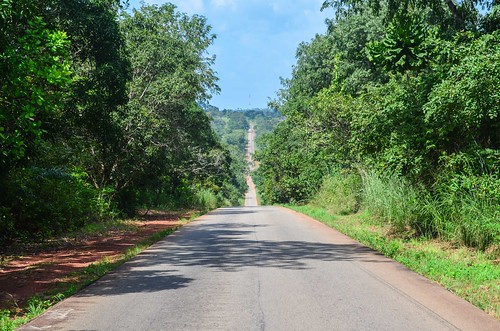
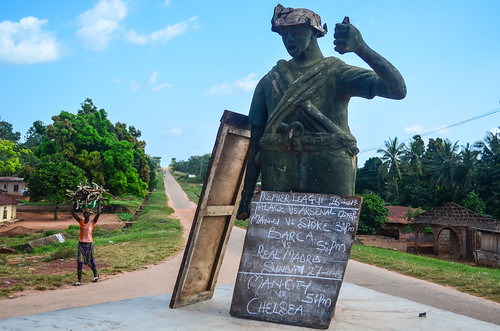
On Sunday morning, like in Ghana, the most Christian-disciplined country I have seen so far, everybody is well dressed to go to church. The women have white outfits and the little girls wear fluffy and colorful dresses.
It is the second time that I pass an ambiguous police checkpoint, where I can’t tell if they joke or not. They say something like “Nigeria is very safe. No problem on that road. Now go before they kidnapp you“.
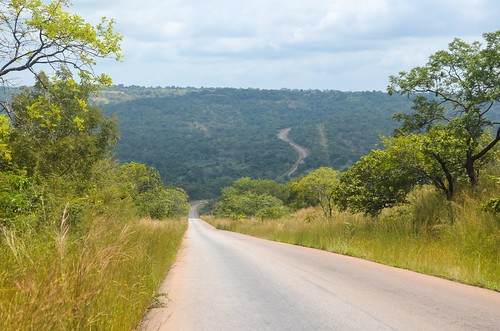

The town of Agenebode (Edo state) lies on the west bank of the Niger river, while Idah (Kogi state) lies on the east bank. The Niger river is the third longest river of Africa (behing the Nile, 6800 km, and the Congo, 4700 km) with over 4100 km from the Guinean highlands, through Timbuktu, and until the oil-rich delta in Nigeria.
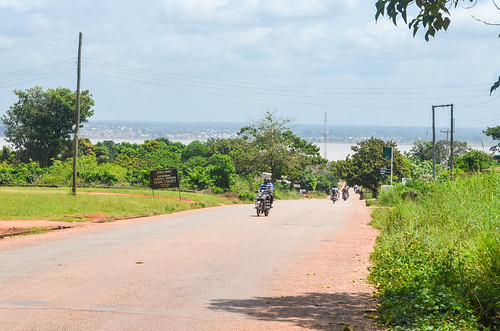
There is no bridge from Agenebode. Considering the importance of the two towns on each side, I thought there would be a ferry. But the only information I could find on the internet concerned how the waters of Nigeria are a great idea for investors, because in Lagos and in the whole rest of the country, the maritime transport is remains unexploited.
The river is about 2 km wide, so I cycled until Agenebode betting there would be a pirogue or a boat service. And fortunately, there is. I started to doubt about it when a girl working at a hotel told me her family lives across the river, and she takes a taxi to go all the way around. The next bridges are 100 km to the south (Onitsha) or 50 km to the north (Lokoja).
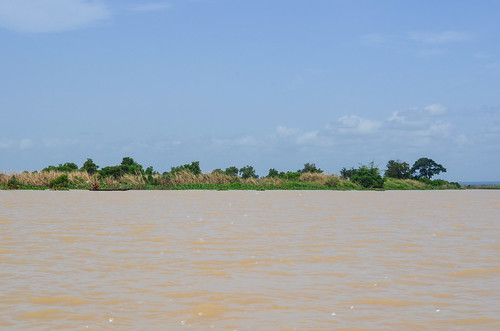
Fortunately indeed, I continued straight downhill into Agenebode, crossed an empty market and landed on the river banks, close to a speedboat parking. There are a dozen of boat pilots taking turns and no passengers. The previous boat has just left, so the usual bargaining game starts: will I want to pay to charter a speedboat just for me, or wait that 10 people show up?
I usually play the full waiting game, but not this time. I finally let go 2000 naira (9 €), which I estimate a good price for a private motorized crossing. At the last moment, once my bicycle is in, two young people join me, a man and a woman, so that makes the four of us on the boat.
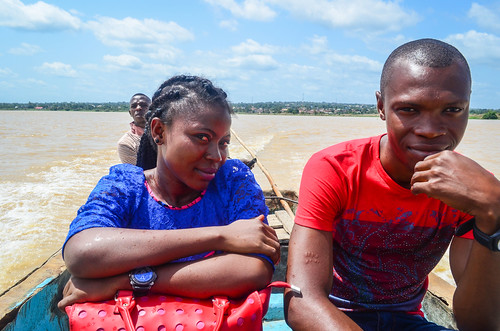
We chat until halfway. Right in the middle of the river, the engine stops. The pilot can’t restart it. The girl starts crying.
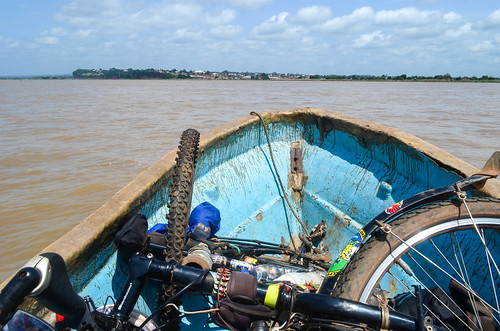
Every time I axed the question, it appeared that Africans can’t swim. Even those doing laundry and bathing in a river or a lake everyday. Why so, I don’t know. There are even fishermen, working all day long on tiny pirogues, who can’t swim.
The girl is invoking Jesus and doesn’t stop praying. I axed her, she can’t swim. The man is trying to comfort her. I axe him too: “Can you swim and save her if needed?“, he answers “I can try“. Sure …
I don’t worry too much because the water is quiet and the boat in a rather good shape, so in the very worst case, we will end up at the next bridge downstream or crash on a bank. It is just part of the fun of traveling in Africa (once freed from the western expectations and time constraints, an important prerequisite!): no matter how much you pay and how good something looks, anything can happen anytime.
The pilot opens the hood of the engine and start unscrewing the first screw. I see it is going nowhere, and the girl is still reciting her prayers. One can just google “capsize + nigeria” to see the huge toll deaths that regularly happen because rusty ferries are overloaded with people who can’t swim. River navigation scares people.
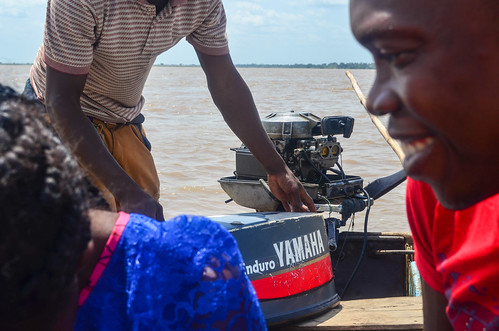
But fortunately, there is another speedboat nearby. It seems to be already tired to another one. When they come close, we learn than the previous speedboat had also broken down and was being pulled by this savior. The savior sends us a rope and we are now 2 boats being towed at the same time.
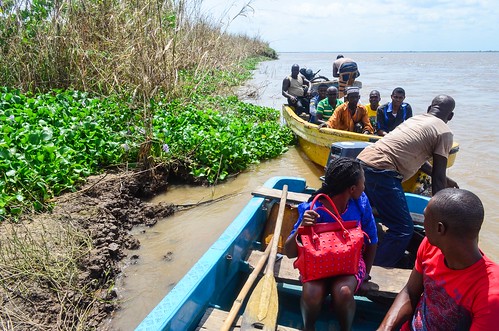
We make a brief stop on the shore to jump, all of us, the luggage and my bike, into one single boat, that drives us to the port of Idah. I am happy to be on the land again, not for the fear of the river, but for the relief of having found a boat making me avoid Benin City, Onitsha and Enugu, three populous cities of the top 20 (over half a million inhabitants each) along a busy road link.
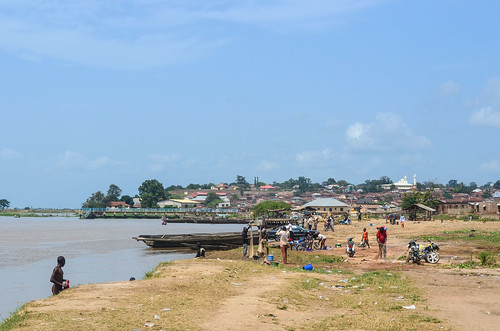
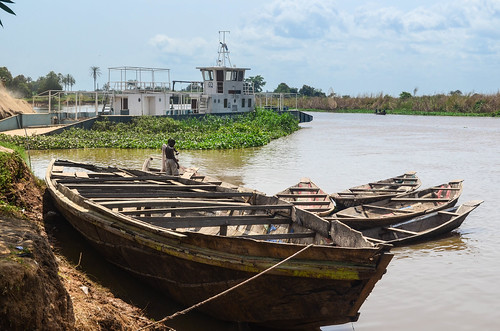
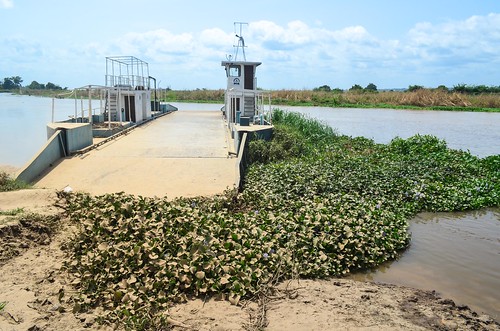
I have the afternoon to ride this long straight road through Kogi state until Enugu state. It is very empty from cars, which is pleasant, but also empty from villages. There is not so much along it, and I am happy, and exhausted, when I reach at 5 the town of Odoru, the only one of the area with a hotel.
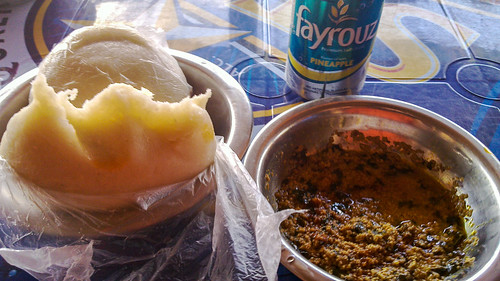
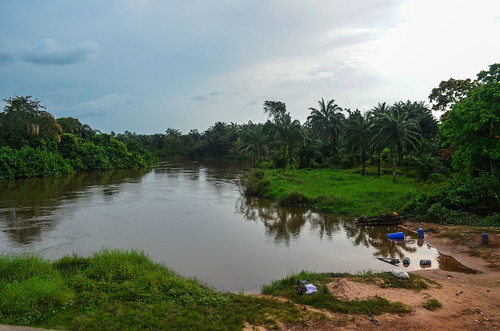
Bad luck: the hotel has no vacancy. The people tell me to go to Nsukka, but it is too far. I can’t cycle 30 km in 1 hour, being already exhausted with 110 km in the legs. I had only one meal today and I didn’t manage my water very well.
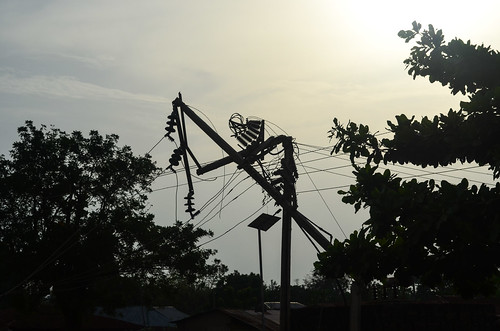
I continue and hope to find something on the way before night, which means very soon. I must go as fast as possible, but it is hard in these conditions. There is nothing to sleep at. I ask in the village of Okutu, but the only answer I collect is “Keep going …“. Around Okutu, the road is so bad that it is reduced to a rocky track with hugs cracks in it. The slopes are very steep, and I reach the next community, Okpudje.
There, I receive the same mild welcome: people don’t want me to stay around. But it is 6 and almost night. They say the road to Nsukka, another 20 km, is safe even at night, but it is a rule of thumb to never be on unknown roads at night in Africa. It is even worse on a bicycle, and I can imagine double worse in Nigeria.
At the end of Okpudje, there is a quite large house in a compound, and it is my last chance. I am told this is where lives the church reverend. So I go and ask if I can camp inside the compound. But before I can say anything, I am surrounded by kids and two people ask me all sorts of questions. They also ask me to empty my bags to see if there is a bomb. The priest speaks German.
I don’t like to disclose much information about me and my destination to random people. It is not a welcome I expected, but it is night already and I have nowhere to go, so I comply. As I don’t want everyone to see all my stuff, we move a slightly inside, and I have to exhibit all the contents of my luggage while answering an interrogatory in German.
After this preliminary check, I am invited to stay in the house, they even have a spare room, and to join their dinner. It is great, but why all this formal investigation? I have never been searched my luggage at any checkpoint by any official, and now a priest does it?
He later explains me that they are truly scared of Boko Haram. I am someone with a beard, an unconventional mean of transport, going to a priest’s house, so it makes things worse. They suspect anything looking strange, and a white man on a bicycle with a beard is something strange.
I am surprised to see they were more scared of me than I was scared of Nigerians. Once in the house, everyone is really kind. Joseph studied for 9 years in Germany before heading the St Paul’s parish in Okpudje. We swap between English and German.
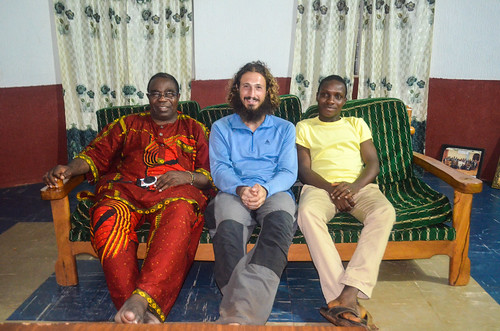
We talk a lot, about the church that should be one and not as divided as today, where people ask “Okay, you’re Christian, but which one? Baptist? Pentacostal?“. It divides the Christ and it should not.
Boko Haram went further than their northern home territory, a couple of years ago, bombing near Abuja, halfway south. But Joseph says it is currently safe from Abuja until the south. The roads are safe even at night, as no armed robbery is reported.
He thinks that in general Africans lack adventure and investigation spirit, quoting the example of his German friends, seen hiking of the top of a mountain that locals were worshiping because no one dared climbing it.
As for Nigeria’s problems between Christians and Muslims, he said a summit was held in Abuja to investigate how to live better together. But it can’t be working, because unlike the churches, each imam can preach his own interpretation of the Quran.
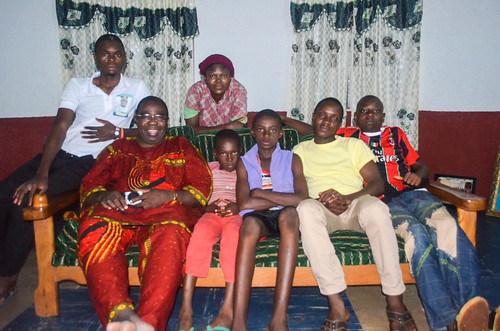
After a river crossing and 132 kilometers today, passing through three states (Edo, Kogi, Enugu), the people are now Igbo. My Yoruba greetings are useless. English is the only language that spreads across all the regions.







Came across your post while searching for how to ferry my car across the river Niger from Agenebode to Idah.
I’m glad to know you enjoyed your time in Nigeria.
Nice one! i wish i can just carry my bag one day and travel around my country nigeria but to tell you the truth, Nigeria is not safe
Am very pleased my friend with your adventure i will like you to join my forum in helping Biafra to understand how the river niger is very important in the existence of one Nigeria and to help biafran understand how blessed they are tbe Ibos cause it seems like you had more fun with them
Thanks Mongad 4108684146
Hi JB, what a mouth-watering pleasure to read about your adventures! Thanks for sharing it with the world. I ended up on your site when I searched for “nouakchott” on vimeo. Regarding your cute snails, here’s an interesting story about nigerian snail smuggling, supposedly carrying parasites: http://www.dailymail.co.uk/news/article-2691930/Giant-African-snails-seized-Los-Angeles-airport.html
Thanks! They must have had fun at the customs in LA!
JB you mean you were at my village (Agenebode?) Waoh! you really have to come again cause this time around I’m now a grown up. let’s explore together